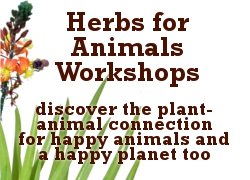Modern living, stress and your companion animal’s wellbeing ~ Part 1
Cara Williams
http://happinessis.co.za
(visit the Happiness Is site to see if you qualify for free Bulbine seeds!)
If you are interested in Herbs, do sign up for the Happiness Is Newsletter and visit their site for news of upcoming workshops)
Cara Williams
http://happinessis.co.za
(visit the Happiness Is site to see if you qualify for free Bulbine seeds!)
If you are interested in Herbs, do sign up for the Happiness Is Newsletter and visit their site for news of upcoming workshops)
.

Did you know that modern living can be stressful for your companion animals, in turn, making it tricky for them to achieve wellbeing? What we know about stress in humans is relevant to cats and to dogs, and horses for that matter. This is because stress affects our bodies in much the same way. However, while the physiology of stress may be the same whether you are a cat, horse, dog or human – the causes will be different.
Some Important Concepts
Our companion animals have behavioural needs that they prioritise. They need to meet these needs on a daily basis if they are to be as happy and healthy as possible.
Scientists refer to this list of behaviours as the animal’s ethogram – and every species has its own. For example, in terms of eating, a cat is designed to eat a number of small meaty meals a day, a horse to graze and forage for up to 18 hours a day and a dog is happy to eat once or twice a day, with some chewing in between.
If animals are restricted from performing their ethogram – which is often the case in the modern domestic setting – they can suffer an element of stress, just as you would.
There are two types of stress: short-term and long-term. A lion’s body is perfectly designed to deal with the short-term physical stress of sprinting for a meal. This is true for most animals, including ourselves. In nature, stress is about being able to muster up the energy to fight or flight in an immediate crisis. This may require the temporary shut-down of some less important systems like digestion, but after the fight (or the flight) the stress is over and the body can return to normal.
When an animal finds himself in a stressful situation that he can do nothing about or short-term stressors accumulate, the same physiological response is switched on but can remain “on” for months on end.
Prolonged stress can affect your animal’s mind and immune system and may cause or worsen:
So, short term stress can be good for your animal (like when your cat finds himself having to run from the neighbour’s dog) but long-term stress can compromise his overall wellbeing.
So what can we do to encourage our animals to meet their ethogram on a daily basis, and in turn, avoid the negative effects of long term stress?
In Part 2 we will explore fun and practical ways to provide our animals with the freedom to meet these needs in the modern domestic setting. You will be amazed how a few simple changes will ease behavioural challenges, and enhance general health and happiness.
Read Part 2
Some Important Concepts
Our companion animals have behavioural needs that they prioritise. They need to meet these needs on a daily basis if they are to be as happy and healthy as possible.
Scientists refer to this list of behaviours as the animal’s ethogram – and every species has its own. For example, in terms of eating, a cat is designed to eat a number of small meaty meals a day, a horse to graze and forage for up to 18 hours a day and a dog is happy to eat once or twice a day, with some chewing in between.
If animals are restricted from performing their ethogram – which is often the case in the modern domestic setting – they can suffer an element of stress, just as you would.
There are two types of stress: short-term and long-term. A lion’s body is perfectly designed to deal with the short-term physical stress of sprinting for a meal. This is true for most animals, including ourselves. In nature, stress is about being able to muster up the energy to fight or flight in an immediate crisis. This may require the temporary shut-down of some less important systems like digestion, but after the fight (or the flight) the stress is over and the body can return to normal.
When an animal finds himself in a stressful situation that he can do nothing about or short-term stressors accumulate, the same physiological response is switched on but can remain “on” for months on end.
Prolonged stress can affect your animal’s mind and immune system and may cause or worsen:
- Behavioural problems (including anxiety, restlessness, nervous tension, inappropriate toileting, over grooming, noise phobias, irritability and aggression, etc) and,
- Stress-related disease (including some cases of diarrhoea, vomiting, loss of appetite, eczema, cystitis, etc).
So, short term stress can be good for your animal (like when your cat finds himself having to run from the neighbour’s dog) but long-term stress can compromise his overall wellbeing.
So what can we do to encourage our animals to meet their ethogram on a daily basis, and in turn, avoid the negative effects of long term stress?
In Part 2 we will explore fun and practical ways to provide our animals with the freedom to meet these needs in the modern domestic setting. You will be amazed how a few simple changes will ease behavioural challenges, and enhance general health and happiness.
Read Part 2

A series of five 1-day workshops looking at herbs that help keep animals happy and healthy – in mind and body. Applicable to dogs, cats and horses (and other animals). No previous experience with herbs is required.
Download (PDF): Herbs for Animals Workshops – Prospectus 2012
Download (PDF): Herbs for Animals Workshops – Prospectus 2012
- Information-packed and fun-filled.
- Explore new ideas about animal wellbeing from herbal traditions and modern science.
- Learn the benefits of herbs as first-aid remedies, to prevent disease, and to enrich the environment of animals.
- Create your own herbal first-aid kit for animals from scratch in the practical sessions.
- Receive five herbs on each module to stock your animal wellbeing garden at home.
- Enjoy delicious, wholesome food to keep you nourished throughout the day.
- Take home a full set of course notes and recipes to refer to.
- Connect with like-minded people, make new friends that share an interest in herbs and animals.
This article is copyrighted and remains the property of the author. Individuals are welcome to print or copy same for their own use in furthering their knowledge of dogs. However, no reproductions or alterations/variations are allowed without the express written consent of the author.
